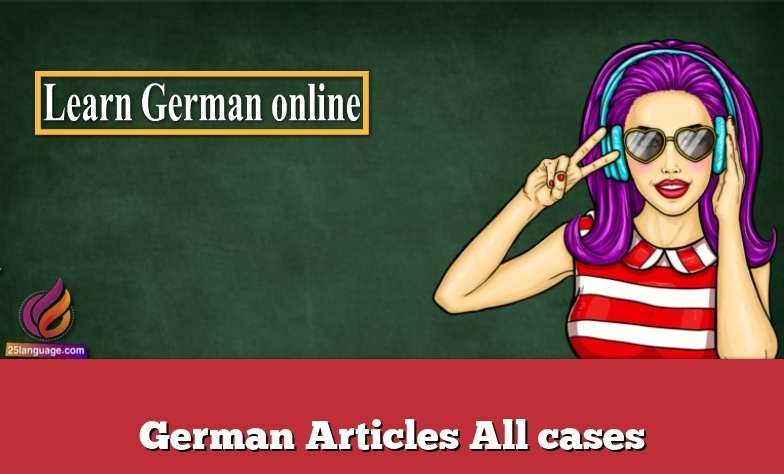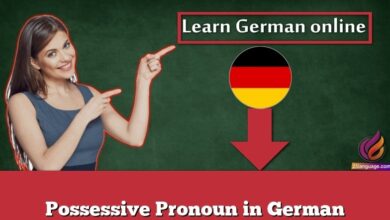German Articles All cases
German Articles with 6 Easy to Remember Tables

Articles in Gwerman are the most commonly used words in all the languages. If you are a beginner, German articles can be a bit confusing.
You may find it difficult to remember the correct German articles all the time. But, don’t worry! We have simplified the learning process for you.
German Articles
Before we start learning the German articles, let’s revise a little about English articles. Nouns are preceded by either definite or indefinite articles. ‘The‘ is a definite article. ‘The’ is used to talk about a specific thing. For example, I want the pen. ‘A‘ or ‘An‘ are indefinite articles. They are used to talk about general things or places. For example, I want an apple. / I want to visit a museum.
In English, the articles remain the same, irrespective of the gender of the noun. However, German articles change according to the gender of the noun. German nouns are either masculine, feminine or neuter. Accordingly, the articles are as follows:-
- Masculine – der
- Feminine – die
- Neuter – das
There is no logical rule to guess the gender. So, it is important to always learn the nouns with their articles.
Do you want to know an easier way to remember the German articles? There are a lot of noun endings which always have the same gender. For example, nouns ending in -ung are feminine, whereas nouns ending in -ling are masculine. Isn’t that great!
Study the tables below for details-
Masculine Article “der”
| Noun ending | Example |
| -ling | der Frühling (spring) der Neuling (newcomer) |
| -ismus | der Tourismus (tourism) der Optimismus (optimism) |
| -er | der Fahrer (driver) der Körper (body) |
| -ist | der Journalist (journalist) der Polizist (policeman) |
| -ich | der Bereich (region) der Teppich (carpet) |
| -ant | der Laborant (lab worker) der Diamant (diamond) |
Feminine Article “die”
| Noun ending | Example |
| -ung | die Abdeckung (cover) die Bildung (education) |
| -keit | die Möglichkeit (possibility) die Tätigkeit (activity) |
| -heit | die Einheit (unity) die Gewohnheit (habit) |
| -ion | die Position (position) die Kommission (commission) |
| -in | die Bäckerin (baker) die Dichterin (poetess) |
| -tät | die Identität (identity) die Qualität (quality) |
| -schaft | die Mannschaft (team) die Landschaft (landscape) |
| -enz | die Effizienz (efficiency) die Konferenz (conference) |
| -ie | die Anatomie (anatomy) die Biologie (biology) |
Neuter Article “das”
| Noun ending | Example |
| -chen | das Hähnchen (chicken) das Bäumchen (little tree) |
| -lein | das Fräulein (young lady) das Büchlein (booklet) |
| -ment | das Apartment (flat) das Parlament (parliament) |
| -um | das Studium (degree course) das Datum (date) |
| -nis | das Ergebnis (result) das Zeugnis (certificate) |
Do not forget, there are always a few exceptions! For example- die Kenntnis (knowledge), das Restaurant (restaurant) etc.
German articles are divided into 3 categories:-
- Definite articles (der, die, das)
- Indefinite article (ein)
- Indefinite Negative article (kein)
Now, let’s learn how these articles change according to the case (Nominative, Accusative, Dative or Genitive) and number (singular or plural). It is called as ‘Artikel Deklination’ in German.
Definite German Articles
These are known as Bestimmte Artikel in German. They are equivalent to English ‘The’. Their declension is as follows-
| Mask. | Fem. | Neut. | Plural | |
| Nominativ | der | die | das | die |
| Akkusativ | den | die | das | die |
| Dativ | dem | der | dem | den + n |
| Genitiv | des + s/es | der | des + s/es | der |
- Der Balkon des Wohnzimmers ist groß. (The balcony of the living room is large.)
- Wir erzählen den Kindern die Geschichte. (We are telling the children the story.)
Indefinite German Articles
These are known as Unbestimmte Artikel in German. Ein is equivalent to English ‘A / An’. Hence, it is always used only with singular nouns and never with plurals. The declension is as follows-
| Mask. | Fem. | Neut. | Plural | |
| Nominativ | ein | eine | ein | – |
| Akkusativ | einen | eine | ein | – |
| Dativ | einem | einer | einem | – |
| Genitiv | eines + s/es | einer | eines + s/es | – |
- Die Wohnung hat eine Küche. (The apartment has a kitchen.)
- Das ist ein Kuli. (That is a pen.)
Indefinite Negative Articles
These are known as Unbestimmte Negativartikel in German. There are no negative articles in English. We use the word ‘not’ to indicate negation in a sentence. For example, I do not like apples. But, in German language, we use the article ‘kein’ to indicate negation. For example, Ich mag keine Äpfel. It is used to negate only nouns, not verbs. The declension is as follows-
| Mask. | Fem. | Neut. | Plural | |
| Nominativ | kein | keine | kein | keine |
| Akkusativ | keinen | keine | kein | keine |
| Dativ | keinem | keiner | keinem | keinen + n |
| Genitiv | keines + s/es | keiner | keines + s/es | keiner |
- Das Haus hat keinen Balkon. (The house does not have a balcony.)
- Ich habe kein Auto. (I do not have a car.)



























